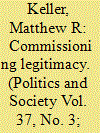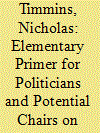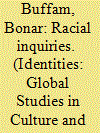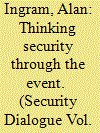| Srl | Item |
| 1 |
ID:
090904


|
|
|
|
|
| Publication |
2009.
|
| Summary/Abstract |
Based on an analysis of the reports of twenty-eight national-level public commission inquiries into events involving ethno-national violence-drawn from five national contexts and arrayed over the course of the twentieth century-this article demonstrates the strikingly transnational character of these investigatory bodies' attempts to authoritatively explain episodes of collective violence and to thereby restore governing legitimacy in the wake of violent crises. One of four distinct "logics," or core explanatory frameworks, each associated with a particular mode of "racial power," characterized a diverse cross-national pool of violence commission reports during defined periods of the twentieth century. In revealing globally encompassing logics to what has often been framed as a national or case-specific phenomenon, the author shows how global ideational currents compose a key dimension of national political dynamics.
|
|
|
|
|
|
|
|
|
|
|
|
|
|
|
|
| 2 |
ID:
167899


|
|
|
|
|
| Summary/Abstract |
There is relatively little central government guidance available on how to set up and run a public inquiry. This short piece seeks to set out the very basic questions that politicians considering creating one—and potential chairs—will need to address. Including, crucially, whether a public inquiry is even the right answer. In the context of the National Health Service, on which this analysis focusses, it also argues that money may be far better spent on applying what is already known from the many previous inquiries—that is, spend it on prevention—rather than waiting to spend it on future similar inquiries that will, more than likely, produce similar findings and recommendations.
|
|
|
|
|
|
|
|
|
|
|
|
|
|
|
|
| 3 |
ID:
173202


|
|
|
|
|
| Summary/Abstract |
Critical race scholarship has effectively documented how the legal institutions of liberal democratic states figure as both mechanisms of systemic racism and avenues of redress against these forms of power. This article offers new insights into the racial effects of these legal institutions by examining the epistemic dynamics of a Canadian public inquiry that was tasked with investigating why state institutions failed to prevent and successfully prosecute the bombings of two Air India flights, which investigators attributed to Sikh nationalist groups operating in Canada. Through a discourse analysis of documents generated during the inquiry, I track how its complex epistemic dynamics precluded recognition of the racial effects of Canadian state institutions. Approaching the inquiry as an instrument of juridical knowledge production and mechanism of political accountability, this article tracks the contingent processes through which liberal epistemologies of race are validated by state actors to extend race’s systemic conditions of existence.
|
|
|
|
|
|
|
|
|
|
|
|
|
|
|
|
| 4 |
ID:
165017


|
|
|
|
|
| Summary/Abstract |
While the turn towards materiality over the course of the last decade has enriched studies of security in a variety of ways, the security field continues to pose challenges for materially oriented thinking. This article argues that while recent materially oriented work on security has been concerned with events, working through the question of the event as a central analytical strategy is a promising way of addressing such challenges and developing broader insights. The article develops this argument by working through a particular event, the killing of the former Russian security agent Alexander Litvinenko in London in 2006 by means of the radioactive element polonium 210. Approaching the event via the archive and report of the public inquiry that subsequently took place into it, and reflecting further on the utility of Bruno Latour’s idea of dingpolitik for materially oriented work on security, the article explores transformations of materiality, politics and publicity, and draws out how polonium 210 came to figure in the killing and the inquiry as actant, trace and evidence. In conclusion, the article reflects on the conceptual value of working through events and the methodological issues raised in the analysis.
|
|
|
|
|
|
|
|
|
|
|
|
|
|
|
|